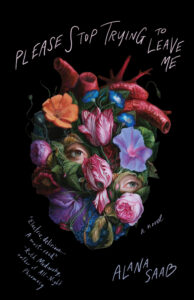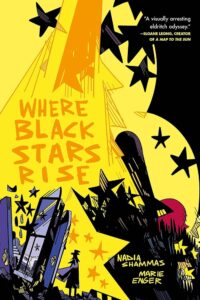Buy this from Bookshop.org to support local bookstores and the Lesbrary!
Please Stop Trying to Leave Me is a deeply engrossing, frenetic, and thought-provoking debut by Portuguese-Lebanese-American writer and screenwriter Alana Saab (she/her).
The story is narrated by Norma, a twenty-seven-year-old, privileged young woman living in present-day New York in the wake of a mental health breakdown. Described by Saab as “experimental”, the novel unfolds over eight months of Norma’s therapy sessions, which are interspersed with short stories from her manuscript. In therapy, Norma explores the “oblivion” that has plagued her since childhood. Though Norma previously only ebbed in and out of oblivion, she now finds herself stuck in it, unable to finish her manuscript and overwhelmed by the signs she believes God is sending her to break up with her girlfriend.
Early in the book, Norma’s therapist diagnoses her with major depressive disorder, depersonalization/derealization disorder, and immense anxiety. Norma’s therapist surmises that Norma is projecting meaning onto her external environment (i.e., signs from God that she should break up with her girlfriend) so that she does not have to do the internal work of reflection. Norma’s therapist believes that this is likely because Norma has experienced significant trauma.
Reading Please Stop Trying to Leave Me was an immersive experience. As someone who struggles with anxiety, Saab’s writing was so authentic that I had to put the book down several times to stop myself from getting swept up in Norma’s chaotic energy. Saab displayed such a high-level understanding of mental health issues and the ways in which they manifest that I was not at all surprised to learn she has a Masters in Psychology. It was also really refreshing that Saab wrote with such unflinching honesty about not only Norma’s traumas, but the reality of being in a healthy adult relationship, including the fact that ambivalence is a normal part of every relationship, romantic or otherwise.
My favorite short story from Norma’s manuscript was “Fertile Ashes”, wherein she charted her main character’s lifelong coming out journey and compared the art of fearlessly choosing for ourselves to the self-immolation and rebirth of a phoenix. I also really enjoyed how clever and incisive Norma was throughout the novel. No matter how heavy the subject matter, she managed to bring levity–whether she was criticizing the arrangement of the pillows on her therapist’s couch or cursing out Joe Biden for lying to the American people and upsetting her girlfriend.
Saab is a masterful storyteller. Although I found Please Stop Trying to Leave Me difficult to get through at times, it was only because Saab had so expertly crafted Norma’s world that its chaos was palpable. I wholeheartedly recommend this book to anyone who’s ever wondered about how the mind works of someone who struggles with depression, anxiety, or dissociation, and to anyone who believes in the healing properties of writing.
Saab lives in New York with her partner. She teaches writing workshops to survivors of domestic violence, human trafficking, and sexual assault through the non-profit Here There and Everywhere. She also mentors incarcerated writers with PEN America’s Prison Writing Program. You can find Saab on Instagram at @alana.saab.
Trigger warnings for discussions of mental health issues, including depression, anxiety, panic attacks, and depersonalization/derealization disorder; recreational and prescription drug use; child sexual abuse; suicidal ideation; and graphic detail of a medical procedure.
Raquel R. Rivera (she/her/ella) is a Latina lawyer and lady lover from New Jersey. She is in a lifelong love affair with books and earned countless free personal pan pizzas from the Pizza Hut BOOK IT! program as a kid to prove it.


